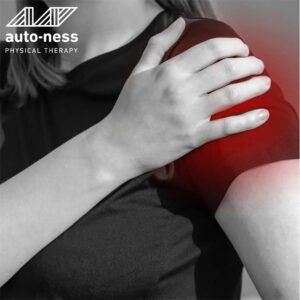Introduction
In the dynamic environment of San Diego, where sports and active lifestyles are prevalent, shoulder impingement emerges as a common challenge. At Auto-Ness Physical Therapy, a leading facility in sports medicine physical therapy in San Diego, we emphasize the importance of comprehensive care – extending from our clinic to your home. This guide aims to provide valuable insights and practical exercises for those searching ‘PT near me’ for effective shoulder impingement management.
Understanding Shoulder Impingement

Shoulder impingement occurs when the rotator cuff tendons are compressed during arm movements. This condition, often resulting from repetitive overhead activities, leads to pain and restricted motion.
Identifying Symptoms:
- Pain During Arm Lifting: This is often the most noticeable symptom. The pain is typically felt when you lift your arm, especially when reaching overhead or behind your back. It might start as a mild discomfort but can progress to a sharp or even debilitating pain. This pain is usually localized to the shoulder but can radiate down the arm.
- Shoulder Weakness: You might experience a gradual decrease in the strength of your shoulder, making it difficult to perform tasks that were previously easy. This weakness is often due to the pain and discomfort causing you to unconsciously limit the use of your shoulder, leading to muscle atrophy over time. Activities like lifting objects, throwing a ball, or even reaching out to grab something can become challenging.
- Decreased Mobility: As the condition progresses, you may notice a reduction in your range of motion. This limitation is often due to the pain and the body’s natural response to restrict movement to avoid further discomfort. You might find it hard to raise your arm above your head or rotate it as you normally would. This can start to interfere with daily activities, such as dressing, washing, or even driving.
- Nocturnal Pain: Another common symptom that people might experience is an increase in pain during the night, particularly when lying on the affected shoulder. This can lead to difficulties in getting comfortable in bed and may significantly impact the quality of sleep.
- Crepitus or Clicking Noises: Some individuals may notice a grinding, snapping, or clicking sound when moving their shoulder. This is due to the tendons rubbing against the surrounding structures.
- Swelling and Tenderness: In some cases, there might be visible swelling or tenderness around the shoulder joint. This is a result of inflammation within the shoulder capsule or around the rotator cuff tendons.

Home Management Techniques
While professional physical therapy is crucial, incorporating home strategies is vital for long-term relief.
- Pendulum Exercise: Lean forward, allowing your affected arm to dangle. Gently swing it in circular motions. Do this for a few minutes, twice daily, to relieve tension.
- Doorway Stretch: Stand in a doorway, arms outstretched and hands pressing against the door frame. Gently lean forward to stretch the front of your shoulder. Hold for 30 seconds, repeat 3 times.
- Wall Push-Ups: Face a wall, placing your hands at shoulder width. Perform push-ups against the wall to strengthen your shoulder muscles without excessive strain.
- Scapular Squeeze: Sit or stand with your arms by your sides. Squeeze your shoulder blades together, hold for 5 seconds, then release. Repeat 10 times.
- Posture Correction: Be mindful of maintaining a straight back and avoiding slouching. Correct posture reduces unnecessary strain on the shoulder.
- Ergonomic Workspace: Ensure your work environment supports good posture. Adjustable chairs and monitor heights can make a significant difference.
Lifestyle Modifications
Incorporate these lifestyle changes for better management:
- Regular Breaks: If your job involves sitting for long periods, take frequent breaks to stretch and move.
- Balanced Diet: A diet rich in anti-inflammatory foods like leafy greens, nuts, and fish can support muscle health.
- Stay Hydrated: Adequate hydration is crucial for joint and muscle health.
Weight Management: Excess weight can put additional strain on your shoulders.
Advanced Home Care
- Self-Myofascial Release: Using a foam roller or a tennis ball, perform gentle self-massage to alleviate muscle tightness.
- Functional Movements: Integrate exercises that mimic daily activities to improve strength and flexibility.
- Mindful Movements: Be conscious of how you move your arms and shoulders throughout the day, avoiding positions that exacerbate pain.
When to Seek Professional Care
If you’re in San Diego and struggling with persistent or worsening shoulder pain, it might be time to consult a professional. Auto-Ness Physical Therapy, known for its expert care in sports recovery in San Diego, offers personalized plans that blend manual therapy with tailored exercises for effective relief from shoulder impingement. As a Medicare therapist in San Diego, our approach is accessible and patient-centered, ensuring you receive the best possible care for your shoulder health.
FAQs on Shoulder Impingement
- Are there specific exercises to avoid with shoulder impingement?
- Avoid exercises that involve overhead lifting or cause pain. Focus on low-impact, strengthening exercises.
- How long does recovery from shoulder impingement typically take?
- Recovery time varies based on the severity, but with consistent exercises and proper care, improvement is usually seen within a few weeks.
- Can shoulder impingement lead to more serious issues?
- If left untreated, it can lead to chronic pain or even rotator cuff injuries.
- Is yoga beneficial for shoulder impingement?
- Yes, gentle yoga that focuses on stretching and strengthening can be beneficial. However, avoid poses that put pressure on the shoulder.
- Should I apply heat or ice for relief?
- Use ice for acute pain to reduce inflammation. Heat can be used afterward to relax muscles.
Conclusion
Effective management of shoulder impingement requires a balance of expert care and proactive self-management. By incorporating these home exercises and lifestyle adjustments, significant improvements in shoulder health can be achieved. If you’re seeking personalized, expert physical therapy in San Diego, consider scheduling a discovery call with Auto-Ness Physical Therapy. Our team is committed to guiding you toward a pain-free, active lifestyle. Schedule your call today and embark on your journey to better shoulder health.


